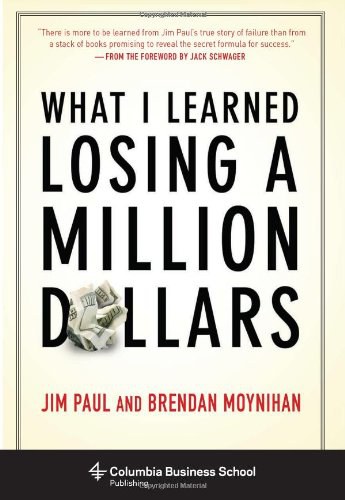
书名:What I Learned Losing a Million Dollars
作者:JimPaul/BrendanMoynihan
译者:
ISBN:9780231164689
出版社:ColumbiaUniversityPress
出版时间:2013-4-30
格式:epub/mobi/azw3/pdf
页数:192
豆瓣评分: 7.7
书籍简介:
Jim Paul's meteoric rise took him from a small town in Northern Kentucky to governor of the Chicago Mercantile Exchange, yet he lost it all — his fortune, his reputation, and his job — in one fatal attack of excessive economic hubris. In this honest, frank analysis, Paul and Brendan Moynihan revisit the events that led to Paul's disastrous decision and examine the psychological factors behind bad financial practices in several economic sectors. This book begins with the unbroken string of successes that helped Paul achieve a jet-setting lifestyle and land a key spot with the Chicago Mercantile Exchange. It then describes the circumstances leading up to Paul's #1.6 million loss and the essential lessons he learned from it — primarily that, although there are as many ways to make money in the markets as there are people participating in them, all losses come from the same few sources. Investors lose money in the markets either because of errors in their analysis or because of psychological barriers preventing the application of analysis. While all analytical methods have some validity and make allowances for instances in which they do not work, psychological factors can keep an investor in a losing position, causing him to abandon one method for another in order to rationalize the decisions already made. Paul and Moynihan's cautionary tale includes strategies for avoiding loss tied to a simple framework for understanding, accepting, and dodging the dangers of investing, trading, and speculating.
作者简介:
[美]吉姆·保罗,摩根士丹利首位负责国际能源部的副总裁,曾任芝加哥商品交易所董事与执委会委员,纵横期货交易业界25年,先后从事散户经纪、场内交易员、研究部主管等工作。
[美] 布伦丹 · 莫伊尼汉,资产管理公司Marketfield Asset Management总裁,范德堡大学欧文管理研究生院财务/金融学兼职教授。
书友短评:
@ 一天一个苹果 This book starts with the tale of Paul's rise and fall, and then it falls flat. According to the book, the rule of thumb is to have a loss control plan, set objectives, and have the discipline to follow the plan. What bothers me is that there is nothing new in all these. Besides, how could we not take successes and failures personally?! @ 🥒困鱼 Exit strategy before enter your position, in investing deductive thinking not inductive thing(conclusion then find support/evidence), DO NOT personalize win or loss not in the investment/market, you invest to achieve money(need or want), not to feel good like gambling. 制定计划,执行计划。Denial, anger, bargaining, depression, acceptance, 经历损失亲人(投资)的5个阶段。 @ 丘品焕 Exit strategy before enter your position, in investing deductive thinking not inductive thing(conclusion then find support/evidence), DO NOT personalize win or loss not in the investment/market, you invest to achieve money(need or want), not to feel good like gambling. 制定计划,执行计划。Denial, anger, bargaining, depression, acceptance, 经历损失亲人(投资)的5个阶段。 @ 慢时光 读了这本书就好像吉俐落(Galileo)发现日心说那样,你成为世界上第一个发现全世界都错了的人。 @ 团喵 纳西姆·塔勒布推荐 @ 岚枫十字 Rather than looking for a formula for success to follow, this book has identified the formula for failure to avoid. 这本书适合从后往前读,最后两章非常有insights,前半本自传我是audible听完的
添加微信公众号:好书天下获取
 好书天下
好书天下
评论前必须登录!
注册